 W
WVice-Admiral Sir Edward Michael Conolly Abel Smith, was a Royal Navy officer who served during the First and Second World Wars.
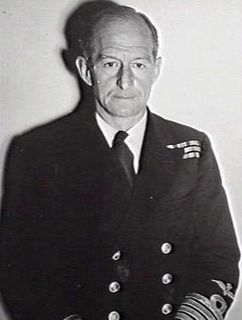 W
WVice Admiral Sir Edmund Walter Anstice, was a senior Royal Navy officer and aviator who served as Fifth Sea Lord from 1951 to 1954.
 W
WGeorge Archer-Shee was a Royal Navy cadet whose case of whether he stole a five shilling postal order was decided in the High Court of Justice in 1910. Archer-Shee was successfully defended by barrister and politician Sir Edward Carson. The trial, which became a British cause célèbre, was the inspiration for the 1946 Terence Rattigan play The Winslow Boy, which has been the basis of two films. Following his acquittal, the boy's family were paid compensation in July 1911. Archer-Shee was commissioned in the British Army in 1913, and killed aged 19, at the First Battle of Ypres on 31 October 1914.
 W
WHarold Harington Balfour, 1st Baron Balfour of Inchrye,, was a Conservative Party politician in the United Kingdom, and a flying ace of the First World War. As Under-Secretary of State for Air in 1944 he was instrumental in the establishment of London Heathrow Airport.
 W
WAdmiral Sir Claud Barrington Barry was a Royal Navy officer who became Naval Secretary.
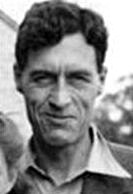 W
WPatrick Maynard Stuart Blackett, Baron Blackett was a British experimental physicist known for his work on cloud chambers, cosmic rays, and paleomagnetism, winning the Nobel Prize for Physics in 1948. In 1925 he became the first person to prove that radioactivity could cause the nuclear transmutation of one chemical element to another. He also made a major contribution in World War II advising on military strategy and developing operational research. His left-wing views saw an outlet in third world development and in influencing policy in the Labour Government of the 1960s.
 W
WRear Admiral Benjamin Bryant, was a Royal Navy officer noted for his submarine exploits during the Second World War. In terms of ships sunk, Bryant was the most successful British submarine ace to survive the war. He was appointed Deputy Chief of Naval Personnel, (Training) from July 1954 to February 1957.
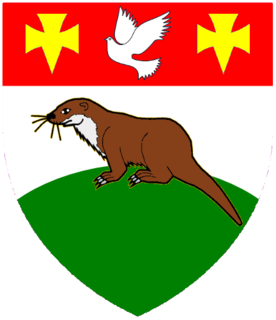 W
WCaptain Richard Duke Coleridge, 4th Baron Coleridge, KBE, DL had a distinguished naval career and served as the first Executive Secretary of NATO from 1952-1970.
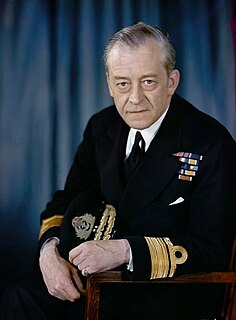 W
WAdmiral of the Fleet Sir George Elvey Creasy, was a senior Royal Navy officer. After serving as a junior officer in the First World War, during which he took part in operations at Heligoland Bight in 1917, he trained as a torpedo officer.
 W
WAdmiral Sir Victor Alexander Charles Crutchley was a senior Royal Navy officer during the Second World War and a First World War recipient of the Victoria Cross, the highest award for gallantry in the face of the enemy that can be awarded to British and Commonwealth forces.
 W
WCommander Chambré George William Penn Curzon, known as George Curzon, was a Royal Navy commander, actor, and father of the present Earl Howe.
 W
WAdmiral Sir Charles Saumarez Daniel, was a Royal Navy officer who went on to be Third Sea Lord and Controller of the Navy.
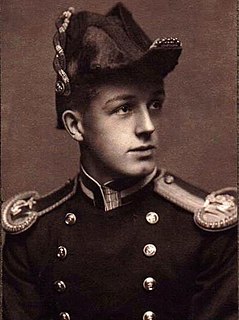 W
WJohn "Jack" Llewelyn Davies was the second eldest of the Llewelyn Davies boys befriended by Peter Pan creator J. M. Barrie, and one of the inspirations for the boy characters in the story of Peter Pan. He served in the Royal Navy during World War I. He was the first cousin of the English writer Daphne du Maurier.
 W
WAdmiral Sir Michael Maynard Denny was a Royal Navy officer who went on to be Third Sea Lord.
 W
WEdward VIII, was King of the United Kingdom and the Dominions of the British Empire, and Emperor of India, from 20 January 1936 until his abdication that December.
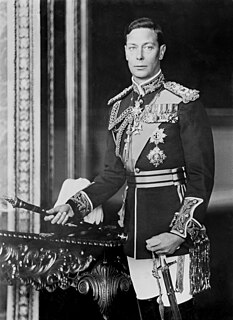 W
WGeorge VI was King of the United Kingdom and the Dominions of the British Commonwealth from 11 December 1936 until his death in 1952. He was also Emperor of India from 1936 until 1947, when the British Raj was dissolved.
 W
WSir Michael Cavenagh Gillett KBE CMG was a British diplomat.
 W
WAdmiral Sir Irvine Gordon Glennie KCB was a Royal Navy officer who went on to be Commander-in-Chief, America and West Indies Station.
 W
WAir Marshal Sir Robert Victor Goddard, was a senior commander in the Royal Air Force during the Second World War.
 W
WRupert Thomas Gould was a lieutenant-commander in the British Royal Navy noted for his contributions to horology. He was also an author and radio personality.
 W
WGroup Captain Sir Louis Leisler Greig, KBE, CVO was a Scottish naval surgeon, rugby player, courtier and a friend of King George VI.
 W
WAdmiral of the Fleet Sir Caspar John GCB was a senior Royal Navy officer who served as First Sea Lord from 1960 to 1963. He was a pioneer in the Fleet Air Arm and fought in the Second World War in a cruiser taking part in the Atlantic convoys, participating in the Norwegian campaign and transporting arms around the Cape of Good Hope to Egypt for use in the western desert campaign. His war service continued as Director-General of Naval Aircraft Production, as naval air attaché at the British embassy in Washington D.C. and then as Commanding Officer of two aircraft carriers. He went on to serve as First Sea Lord and Chief of the Naval Staff in the early 1960s. In that capacity he was primarily concerned with plans for the building of the new CVA-01 aircraft-carriers.
 W
WPrince George, Duke of Kent, was a member of the British royal family, the fourth son of King George V and Queen Mary. He was the younger brother of Edward VIII and George VI.
 W
WAdmiral of the Fleet Sir Charles Edward Lambe, was a senior Royal Navy officer. He fought in the Second World War in command of a cruiser, as Director of Naval Plans and then in command of an aircraft carrier. He served as First Sea Lord and Chief of the Naval Staff from 1959 until 1960 when he was forced to retire early because of a heart condition. He died only a few months later.
 W
WAdmiral Sir Charles Edward Madden, 2nd Baronet, GCB followed his father in a career with the Royal Navy that culminated in his serving as the Commander-in-Chief of the Home Fleet from 1963 to 1965.
 W
WVice Admiral Sir John Maurice Mansfield KCB, DSO, DSC was a Royal Navy officer who became Flag Officer Submarines.
 W
WSir John Cecil Masterman OBE was a noted academic, sportsman and author. His highest-profile role was as Vice-Chancellor of the University of Oxford, but he was also well-known as chairman of the Twenty Committee, which during the Second World War ran the Double-Cross System, controlling double agents in Britain.
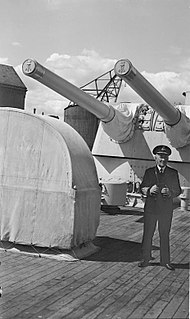 W
WAdmiral of the Fleet Sir Rhoderick Robert McGrigor GCB was a senior Royal Navy officer. He fought in the First World War and saw action during the Gallipoli Campaign and then the Battle of Jutland. He also served in the Second World War, taking part in the sinking of the Bismarck in May 1941, carrying out the office of Assistant Chief of the Naval Staff (Weapons) and commanding the 1st Cruiser Squadron during operations off the Norwegian coast and convoys to North Russia. He served as First Sea Lord in the early 1950s and is most remembered as a leading proponent of carrier-based air power.
 W
WArthur Hugh Elsdale Molson, Baron Molson, PC was a British Conservative politician and member of the Molson family of Montreal.
 W
WAdmiral of the Fleet Louis Francis Albert Victor Nicholas Mountbatten, 1st Earl Mountbatten of Burma, was a British Royal Navy officer and statesman, an uncle of Prince Philip, Duke of Edinburgh, and second cousin once removed of Queen Elizabeth II. During the Second World War, he was Supreme Allied Commander, South East Asia Command. He was the last Viceroy of India and the first governor-general of independent India.
 W
WRear Admiral Anthony Follett Pugsley was a British naval officer. During the Second World War he served as a successful destroyer captain, landed the 3rd Canadian Division on D-Day, and planned and executed the amphibious landings on Walcheren during a critically important phase in the Battle of the Scheldt in late 1944.
 W
WAir Vice Marshal Conway Walter Heath Pulford, was a senior Royal Air Force officer.
 W
WVice Admiral Sir William Geoffrey Arthur Robson, was a Royal Navy officer who went on to be Commander-in-Chief, South Atlantic Station.
 W
WAdmiral The Honourable Sir Guy Herbrand Edward Russell, was a senior Royal Navy officer. He served as Commander-in-Chief, Far East Fleet from 1951 to 1953 during the Korean War, Second Sea Lord from 1953 to 1955, and Commandant of the Imperial Defence College from 1956 until his retirement in 1958.
 W
WRear-Admiral Robert St Vincent Sherbrooke, was a senior officer in the Royal Navy and an English recipient of the Victoria Cross, the highest award for gallantry in the face of the enemy that can be awarded to British and Commonwealth forces.
 W
WThomas Dunlop Galbraith, 1st Baron Strathclyde, PC was a Scottish Unionist Party politician.
 W
WCharles Henry George Howard, 20th Earl of Suffolk, 13th Earl of Berkshire, was an English bomb disposal expert who was also an earl in the Peerage of England, belonging to the ancient Howard family. He was styled Viscount Andover until 1917. He is most famous for being responsible for rescuing a team of French nuclear scientists and the entire world stockpile of heavy water from France to England in the face of the imminent French defeat in 1940.
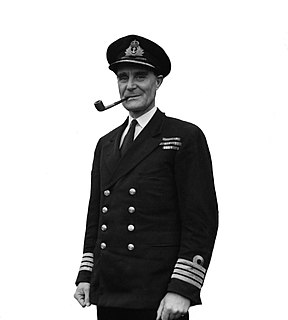 W
WCaptain Frederic John Walker, was a Royal Navy officer noted for his exploits during the Second World War. Walker was the most successful anti-submarine warfare commander during the Battle of the Atlantic and was known more popularly as Johnnie Walker.
 W
WWilliam Cecil James Philip John Paul Howard, 8th Earl of Wicklow, styled Lord Clonmore until 1946, was an Anglo-Irish peer.